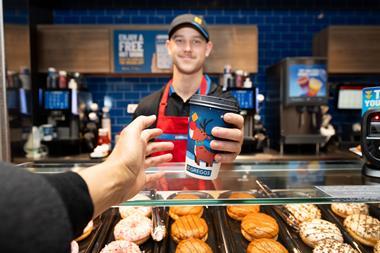News of Sainsbury’s proposed merger with Asda – to create a £51bn-a-year retail behemoth – has caught much of the grocery world unawares.
Currently the second- and third-largest UK supermarket chains, the deal would give them a combined 31.4% share of grocery spend compared to Tesco’s 27.6% [Kantar Worldpanel 12 w/e 25 March 2018].
And now the initial shock has worn off, the news leaves the retailers’ baked goods suppliers facing uncertainty over what the deal could mean for them.
In a statement issued this morning, Sainsbury’s and Asda said the merger would create “significant opportunities for suppliers to develop differentiated product ranges, become more streamlined and to grow their businesses as the combined business grows”.
The word “streamlined” is likely to have prompted concern among suppliers, as is a promise to lower prices by around 10% on “many of the products customers buy regularly”.
While there is nothing to indicate retailers are talking specifically about baked goods, bread is a long-established favourite weapon in the supermarket price wars.
As one senior baking industry figure put it: “I am sure that, along with all suppliers, the comments of 10% savings will ring alarm bells in the baking industry, as it implies they believe that – as the number two and three retailers in the UK – they don’t buy as well as possible.”
Bakery margins have already come under additional pressure as a result of a weakened sterling in the wake of the Brexit vote and raw material costs, such as the eye-watering hike in butter prices, and suppliers have been battling to secure prices increases from their customers.
Many suppliers feel it is inevitable that the merger would heap further pressure on businesses to cut prices – and there are concerns that reducing the so-called ‘big four’ retailers to a ‘big three’ will make negotiations harder than before.
Some industry observers are more positive, with one suggesting: “The retail market is already extremely competitive, part of the reason for the proposed merger, so it should not put pressure on prices of bread and bakery – there is no room for any reductions!”
Meanwhile, the retailers have said there will be “no planned” store closures as a result of the merger, and that both brands will be retained. However, it is likely the competition authorities would insist on some reduction in numbers – particularly in locations where Asda and Sainsbury’s operate stores close to each other.
%%Quote_28%%
This will, of course, potentially impact in-store bakery staff and creates another level of uncertainty for some suppliers.
“Businesses that are supplying either party may be forced to put plans on hold until the situation becomes clearer,” said one senior industry figure.
“NPD is likely to become an early casualty, since one would imagine that there is a degree of SKU rationalisation ahead. Sainsbury’s and Asda have different consumer profiles, so will the stores retain their own identity, or will there be a gradual merging of the two? Again, this will affect the range of products stocked.”
So far, so gloomy. But the deal will also bring positives.
Bakery has played a huge role in differentiating between retailers and creating in-store theatre in an increasingly commoditised grocery industry. This is the reason retailers such as Lidl and Morrisons have been moving baked goods to the front of their stores, and why the likes of Tesco and Asda have made bakery a focus in recent years.
While there is unfortunately months of uncertainty ahead for suppliers, there is no reason to suspect that a combined Sainsbury’s/Asda won’t also place great value on their bakery offer… and, consequently, create opportunities for suppliers.
































No comments yet